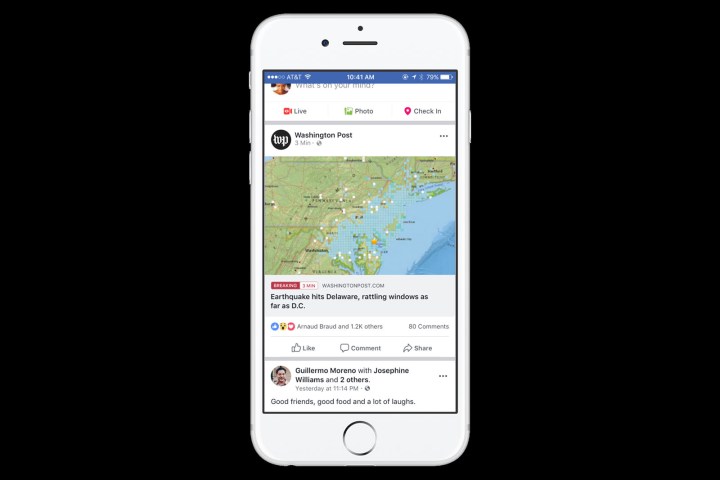As Facebook prioritizes posts from friends, the social media platform is giving news a boost with a red breaking news label. On Monday, March 5, Facebook announced the expansion of a test for a breaking news label on links and Live videos.
Facebook has been testing the breaking news label since last fall, but with positive results from the first round of testing, the company is expanding the test to include 50 more publications. The label adds a red “Breaking News” label for the newest stories, along with how long ago the story was shared. The label is meant to alert users to the more recent news.
Publishers are allowed to use the label once a day, though have a pool of five extra labels to use each month. Along with Instant Articles, and web links, the label can also be applied to Facebook Live videos.
Facebook says that the initial testing has brought an 11 percent increase in shares in a roughly one-month period, along with a seven percent increase in likes and a four percent jump in both comments and link clicks. Users can also report misuse of the label using the drop-down menu in the upper right-hand corner of the post.
Facebook says the test is part of the network’s efforts to show more high-quality news, the second announcement in CEO Mark Zuckerberg’s 2018 goal to make time on the social platform time well spent along with changes like prioritizing local news. The expansion brings the test to a small group of publishers in North America, Latin America, Europe and Australia, in addition to the publications that already had access to the early test.
“We’ve been pleased to collaborate with Facebook to elevate breaking news on their platform and are excited — but not surprised — to see readers respond the way they have,” said Dave Merrell, the lead product manager at The Washington Post, one of the publications with early access to the test. “Delivering accurate information quickly has always been core to our mission, and in an overwhelming news cycle we want our readers to be able to easily identify when there’s new reporting.”
Like all tests, the feature isn’t guaranteed to see a wider rollout, though Facebook’s early results and expansion of the test look promising for the breaking news label.
Editors' Recommendations
- Facebook vows to restrict news access in Canada
- Facebook is courting creators with a new Music Revenue Sharing
- Facebook’s new Collab music app is a fun way to play with others
- Facebook and Twitter flag Trump’s post about mail-in voting
- Facebook will stop accepting new political ads in the week before Election Day





